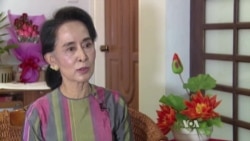In an exclusive interview with VOA’s Burmese Service, Myanmar President Thein Sein called allegations that minority Muslim Rohingya are fleeing alleged torture in Rakhine state "a media fabrication."
"International concern on this issue" is overblown, Thein Sein told VOA Burmese Service Chief Than Lwin Htun Thursday at the presidential residence in the capital, Naypyitaw.
"It is just a media story that boat people are fleeing torture," he said.
"Actually, there are more people willing to live here because it is spacious, [with] many places to live in and work. Some people are writing negative things with malice. International organizations are also helping them [as] well."
The comments are striking, given that most of Myanmar's 1.1 million Rohingya are stateless and live in apartheid-like conditions in Rakhine, on the western coast of the predominantly Buddhist country.
Almost 140,000 Rohingya remain displaced in internment camps after deadly clashes with local Buddhists in 2012. More than 100,000 have fled Myanmar by boat for Malaysia and Thailand. Thousands more have fled overland.
Rohingya tightly controlled
Lacking food and adequate and health care, members of the minority group are heavily restricted in almost every facet of daily life, including education and marriage.
In September, Myanmar confirmed to the United Nations it is finalizing a plan that will offer minority Rohingya Muslims citizenship if they change their ethnicity to suggest Bangladeshi origin, a term most reject because it implies they are illegal immigrants from Bangladesh despite having lived in the area for generations.
On a recent visit to Myanmar, also known as Burma, U.S. President Barack Obama specifically mentioned the tensions and humanitarian situation in Rakhine.
Ethnic tensions with other minority groups also continue in Myanmar.
Regarding the Myanmar army’s shelling earlier this week of a minority Kachin military academy that killed more than 20 cadets, Thein Sein appeared to implicitly implicate the rebels.
"Skirmishes are continuing to this day, but we have ordered our troops not to attack their camps," he said. "Still, everyone has the right to defend his life. So, other than [in cases of] self-defense, our troops will not attack."
Clashes persist
Political issues in Myanmar are just as controversial as the various ethnic conflicts raging in the still-fractured nation.
Critics of the government say the country is sliding back to junta-era restrictions after a timid reformist start.
Opposition leader Aung San Suu Kyi’s National League for Democracy (NLD) wants to change the constitutional prohibition on anyone becoming president whose spouse or children are foreign nationals.
Suu Kyi’s late husband was British, as are her two sons.
"Amending the constitution is firstly parliament’s responsibility, and secondly that of the people," Thein Sein said. "The government cannot dictate [for them] to do this or do that, nor can the military."
But the army retains one-quarter of the legislative seats, allowing it to block constitutional changes. Some lawmakers want to amend the constitution to remove this veto power.
Related report: "Aung San Suu Kyi: Myanmar Opposition to Keep Pushing for Constitutional Change"
Reform talks promised
Unprecedented talks late last month among 14 of Myanmar’s political rivals and powerful military leaders have led to commitments to discuss political reforms and peace talks.
Suu Kyi reportedly held discussions with Myanmar’s armed forces chief, Senior General Min Aung Hlaing, for the first time at that meeting.
Many opposition figures criticized the talks as avoiding meaningful dialogue. Suu Kyi later demanded four-party talks with the president, General Hlaing, the speaker of the house and herself.
“Discussion is the right way [to find a political solution], but only among the four of us is not inclusive enough,” Thein Sein told VOA.
“That’s why we expanded the number pf participants," he said. "So last month, myself and two vice presidents represented the government, both speaker and the chair of upper house attended and leaders of five political parties representing 40 parties. The chief and vice chief of defense also attended."
Responding to critics who say political changes have stalled in Myanmar, the president countered that the country is now in what he called "the third wave of reform."
Myanmar won wide sanctions relief from Obama after its sudden shift from a half-century of military rule, but there's little certainty about the country's future. Questions remain whether the U.S. offered too many overtures to the long-isolated country too soon.
Myanmar was under absolute military control from 1962 until 2010. Thein Sein, a retired army general, has been president since 2011, following a four-year stint as prime minister.
He told VOA he has not decided whether to run for a second term in presidential elections scheduled for 2015.
Regardless of who is in office, Thein Sein added, the priority should be the country’s stability and people’s livelihood, with a focus on providing basic services for the poor.
VOA correspondent Steve Herman contributed to this report.







